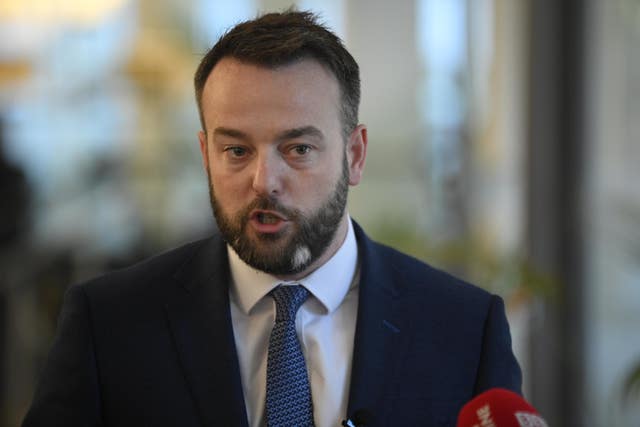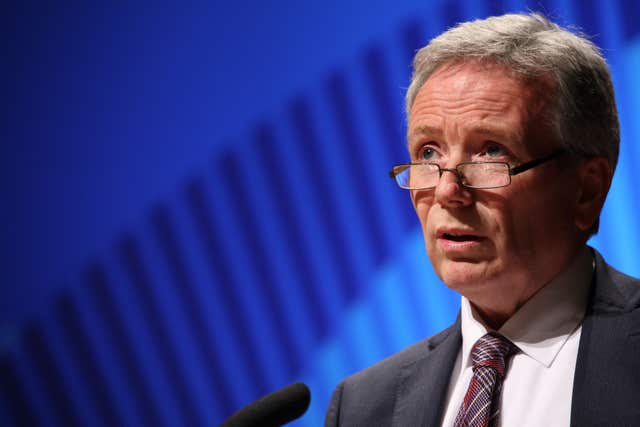Stormont is facing renewed calls to introduce vaccine passports after escalating pressures on the health system saw ambulances diverted away from a main hospital.
Craigavon Area Hospital in Co Armagh stopped receiving ambulances carrying patients with non-life-threatening conditions on Sunday night due to severe capacity issues in its emergency department.
At one point there were 108 patients waiting in A&E, 32 needing hospital admission.

However, the hospital, which had 123 Covid-19 inpatients last night, only had three available beds.
The boss of the Southern Health and Social Care Trust said it was “exceptionally close” to declaring a major incident alert.
Shane Devlin said the health service in Northern Ireland was “on the edge”.
The worsening situation within the region’s under-pressure health system comes amid increasing Covid-19 transmission rates, particularly among young people.

Stormont Communities Minister Deirdre Hargey said the Executive will have a “dedicated discussion” around the situation at its meeting on Wednesday.
“We have asked the Health Minister to bring forward a detailed update in terms of looking at options going forward,” she told reporters at Stormont.
“We have always said that we will be led by the health and medical advice, and indeed we will discuss that in greater detail on Wednesday.
“We’re all acutely aware of the issues that we have seen over the weekend and that presents real concerns for us, and indeed once we get that assessment from health professionals, we will take that seriously in terms of recommendations that they make going forward.”
Responding to the incident in Craigavon, the British Medical Association called on the Stormont Executive to revisit the issue of vaccine passports as a priority.
Making certification a legal entry requirement for hospitality venues has been credited with driving up vaccination rates among young people in the Irish Republic.
North of the border, the Executive has recommended that nightclubs and other venues carry out Covid entry checks and an official app has been developed to enable people to show proof of their vaccine status.

However, the administration has stopped short of making it a legal requirement of entry.
The issue has divided the five-party coalition, with the SDLP and Alliance Party calling for legally enforceable Covid passports for nightlife venues.
BMA Northern Ireland Council chair Tom Black said: “We have not even entered the winter months when traditionally we see our hospitals under tremendous pressure.
“Hospitals and indeed our whole health service was already struggling, but Covid and the added pressure from an increased number of patients is simply too much.
“We need to address these issues now. While vaccines are doing the job of keeping many people out of hospital, we also need to see masks being worn, contacts limited where possible and for everyone to come forward for boosters and flu jabs. The Executive should also revisit the use of Covid passports as a priority.”
SDLP leader Colum Eastwood accused the two main Executive parties – the DUP and Sinn Fein – of political “cowardice” and he warned that Northern Ireland could be facing fresh restrictions if certification was not introduced urgently.

The DUP and Sinn Fein have expressed doubts over a mandatory system, indicating their preference for a “partnership approach” with the hospitality industry.
“The message from our health service has been clear – they are on the brink of collapse and want to see urgent mitigations introduced, including the immediate introduction of vaccine certifications to take the pressure off staff and allow patients to get the care they need,” said Mr Eastwood.
“Health Minister Robin Swann (Ulster Unionist) has previously warned that our hospitals will have to turn people away if the situation worsens and we saw that play out last night at Craigavon Area Hospital.
“Sinn Fein and the DUP have thus far shown stunning political cowardice on this issue, a total abdication of leadership. They are unwilling to take the tough decisions needed to protect our health service and the public. This isn’t easy, since calling for the introduction of vaccine certifications myself and party colleagues have been harassed and protested against but our primary concern remains protecting people.
“We now face a stark choice, time is running out and this decision should have been made weeks ago. To protect our health service, so that cancer sufferers, people in need of urgent operations and others in desperate need of medical attention get access to the treatment they need, we will have to introduce vaccine certification or further restrictions to stop the spread of the virus.”
However, DUP Agriculture Minister Edwin Poots said he was not in favour of compulsory certification.
“I don’t support that at all,” he told BBC Radio Ulster.
“I am very clear that vaccination is the best means of creating normality and it has allowed us to create a significant normality once again in terms of our day-to-day lives. And I think that, you know, people should get vaccinated and I’ll encourage and cajole and pressurise and have done that with people who I know who have been hesitant.
“But forcing people to do something isn’t going to work. It’s not going to get those last few over the line. Over 90% of people are vaccinated and we need to continue to encourage the remainder to get vaccinated, but forcing them is not going to work.
“And I don’t think that creating a two-tier system for so many things is something that I would be prepared to accept.”
The ambulance divert at Craigavon was ended at 10pm on Sunday.
Southern Trust chief executive Mr Devlin, who has responsibility for the hospital, said the “vast majority” of the “exceptionally unwell” Covid-19 inpatients they were admitting were unvaccinated.
He told the BBC the trust was “exceptionally close” to declaring a major incident on Sunday.
“The system that we have, particularly with the level of Covid that we have in our hospitals at the moment, the system is absolutely on the edge in Craigavon and Daisy Hill (hospital) and the other trusts,” he said.
Meanwhile Mr Swann said the Joint Committee on Vaccination and Immunisation’s recommendation to extend the Covid-19 vaccine to the 40-49 age group and offer second doses to 16 to 17-year-olds will be implemented in Northern Ireland.
Mr Swann said he will announce very shortly a “series of initiatives”.
“These initiatives will include a further programme of walk-in and pop-up clinics – for booster doses, as well as vaccination opportunities for 12 to 17-year-olds, and for first and second doses generally,” he said.
“I would again urge people who have not yet come forward for their first dose to do so without further delay. Vaccination is the most important thing we can do to protect each other and support our health service during what will be an incredibly tough winter.”
The Department of Health indicated the booster doses will be rolled out on a phased basis, given the six-month minimum gap between second doses and booster doses.
The department said the number of booster/third doses delivered in Northern Ireland has passed the 200,000 mark.




Comments: Our rules
We want our comments to be a lively and valuable part of our community - a place where readers can debate and engage with the most important local issues. The ability to comment on our stories is a privilege, not a right, however, and that privilege may be withdrawn if it is abused or misused.
Please report any comments that break our rules.
Read the rules here